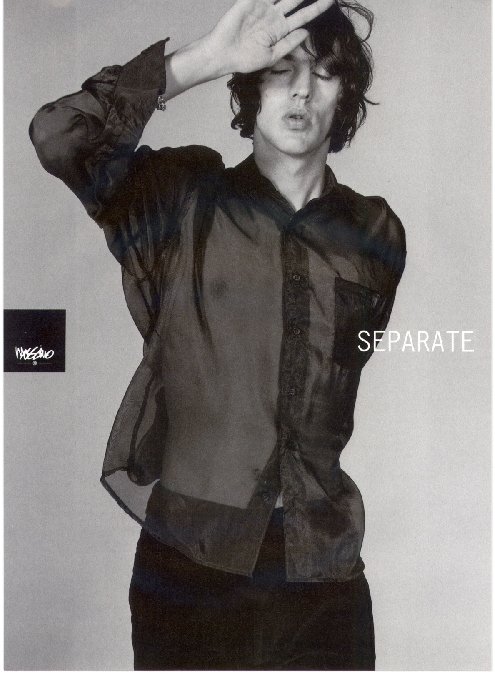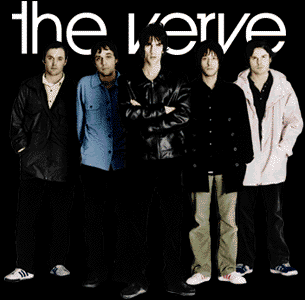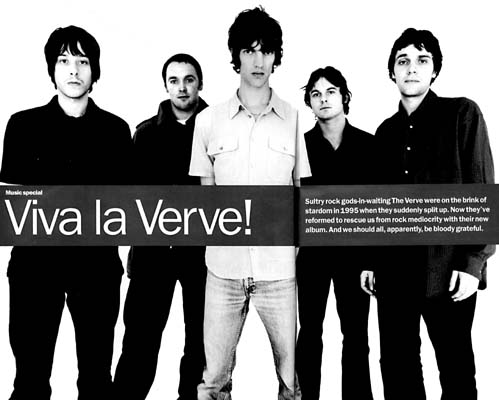The Verve's Trauma Lessons

Richard Ashcroft as a model for Mossimo, early
90s, courtesy of Verve
Universe.
by Jessica Rotter
A couple of years ago, I was introduced to a song called"History"
from the album A Northern Soul (Vernon Yard/Hut), by a not very widely known group
called The Verve. The song was filled with strong and dynamic vocals surrounded by
rich, orchestral instrumentation. It immediately stole my heart, and I knewóright
thenóthat this band was special. However well deserved, I never anticipated the magnitude
of the success that they would later achieve.
After the
release of A Northern Soul, their second album, the Verve suffered a harsh break-up,
but after a short time apart, decided to come back together and keep The Verve going.
Going through the break-up and then coming back together helped them to grow and
become a stronger unit . As vocalist/guitarist, Richard Ashcroft explained,"The
band split up after we put out the single, Historyó for reasons that we can't go
into. What took place was that every member of the band was told what was going to
happen, and then I went off on holiday. This was before I heard History on the radio.
I was looking over the ocean when I heard it played for the first time, and it was
a really moving experience. I made some phone calls and said, ëLet's just keep doing
somethingójust to fill the time, there's no point in stopping dead.' Because there's
no way you can stop dead. That's an impossibility, actually. So the reason things
happened the way they did was because they had to happen that way. I had to write
songs, and we had to go and be creative because we don't know how to do anything
else. (laughs) We're terrible at doing anything else, basically."
ìYou've got
to learn empathy through other people, I thinkóto be able to understand. During that
two year period, before we broke up, I think I became whatever a ëman' is. I think
I definitely made a transition from late teens /early twenties to twenty-five. I'd
been through a lot of shit, experienced a lot of things and it gave me the mind-set
to have the hindsight to look back and say, ëyeah, well I might have done that, or
I might have done this, and I might have done...whatever.' But for me, the main feeling
was towards musicóthe stage, the showsóthe whole feeling when your band is working
and doing it; your music is out thereÖI realized just how much I missed that and
how much I need to do that."

Group shot courtesy of The Official Verve Homepage .
We'd come to a point where it
wasn't one hundred percent, and I think withot going through a bit of trauma, we
wouldn't have what we've got now...which is special.
ìFor me,
personally, no matter how traumatic the break-up was, or actually recording and after
that was, looking back at it, I wouldn't change a thing. I definitely feel older
through the experience, and without itóif we had just carried onówe wouldn't have
gotten that feeling we have now where everyone is totally into what we're doing.
We'd come to a point where it wasn't one hundred percent, and I think without going
through a bit of trauma, we wouldn't have what we've got nowÖwhich is special. We
lost it along the way, but being older about it now we can look back and never let
that happen again."
During
this period, the Verve also acquired a new band mate, guitarist/keyboardist, Simon
Tong. On Simon, Richard states,"Well, he's a musician of such qualities that
he puts his soul on a piece of music. I think it's that way for all of us. If you
take one of us away it's not the Verve anymore. And that's basically what happened.
Nick left and it wasn't the Verve anymore." (Lead Guitarist, Nick McCabe subsequently
patched up his differences with Ashcroft and returned to the band.) We didn't realize
how much we were into the Verve until we lost it. We always knew it was special,
but to go in without Nick and record made us realize that a part of the spectrum
was missing." The lineup also includes Simon Jones on bass and Peter Salisbury
on drums.
With the release
of their new album, Urban Hymns (Virgin/Hut), the Verve prove that they are special,
having delivered a song that launched a small invasion on American radios and has
even been included in a Nike commercial. The single"Bittersweet Symphony"
is undeniably a good portion of the reason why the November 6th show at Irving Plaza
was completely sold out. An additional show was added, which also sold out just as
quickly.
...there's no way you can stop dead.
That's an impossibility, actually. So the reason things happened the way they did
was because they had to happen that way. I had to write songs, and we had to go and
be creative because we don't know how to do anything else.
Ironically,
the Verve received no money whatsoever for their breakthrough hit. Through a court
decision, the Verve lost all royalty rights to the song to ABKCO music, owner of
the copyright to The Rolling Stones ë60's hit, "The Last Time," which was
sampled (four bars on one track) and rearranged in "Bittersweet Symphony."
They donated their performance royalties from the Nike commercial to the British
Red Cross Landmines Appeal and to Youth 2000, a charity benefiting the homeless in
London. But the song has paved the way for their recognition. As Richard has stated,
they wrote that song and can write more songs like it.
At Irving
Plaza on November 6th, Richard Ashcroft scurries onto the stage and all eyes are
on him. As a front-man he brings an amazing amount of energy to the band. They launch
into their set and the psychedelic electric sound surges into the audience, overpowering
the cheers of welcome. Simon Jones' rock solid bass interplays with Nick McCabe's
heavy guitar riffs. As Ashcroft yells,"How many of you are here for a Northern
Soul?" The ecstatic crowd answers loudly and reassures Ashcroft that the Verve
have landed and will probably stay for a while. I like extreme music and I think
we've got people listening. We're gonna take them on a really mad trip; on an adventure
like all the great bands should.
Earlier, Richard
elaborated on the topic of success."That's what I meant about why the Verve
becoming one of the biggest bands in the world is important. That's all I've ever
really wanted. I like extreme music and I think we've got people listening. We're
gonna take them on a really mad trip; on an adventure like all the great bands should.
When John Lennon put his guitar down for three years, totally understandable - he
didn't need to make music, he didn't want to. But at one point he did, and he needed
to again. You've got to be careful with the muse; the way you manipulate the magic;
you can never tell when it's gonna stop."
Interview Transcription: Miae
Shin

Group shot courtesy of Verve Universe .
1998 ©TransACTION Inc. All
Rights Reserved.
Go to: TransAction Magazine: Front Page
Go to: TransAction Magazine: July 98 issue


